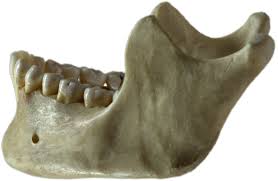记忆方法
发音想成“嚼”(要靠颌,颚才能嚼)。
2. perhaps related or cognate with chew.
2. perhaps related or cognate with chew.
中文词源
jaw 下巴
来自Proto-Germanic*kawo,下巴,来自*kewwana,咀嚼,词源同chew.
英语词源
- jaw
-
jaw: [14] Given that it is a fairly important part of the body, our knowledge of the origins of the word for ‘jaw’ is surprisingly sketchy. The Old English terms for ‘jaw’ were céace (modern English cheek) and ceafl (ancestor of modern English jowl), and when jaw first turns up towards the end of the 14th century it is in the form iowe. This strongly suggests a derivation from Old French joe ‘cheek’, but the connection has never been established for certain, and many etymologists consider it more likely that it is related to chew.
- jaw (n.)
- late 14c., "the bones of the mouth," perhaps from Old French joue "cheek," from Gaulish *gauta "cheek," or perhaps a variant of Germanic words related to chew (q.v.); compare also jowl. Replaced Old English ceace, ceafl.
- jaw (v.)
- 1610s, "to catch in the jaws, devour," from jaw (n.). In slang from 1748, "to gossip, to speak" 1810, "to scold." Related: Jawed; jawing. Hence 19c. U.S. slang jawsmith "talkative person" (1887).
权威例句
- 1. His jaw was broken after he was hit on the head.
- 他的头部受重击之后下颌骨折了。
- 2. He thought for a moment, stroking his well-defined jaw.
- 他摸着自己轮廓分明的下巴想了一会儿。
- 3. They took my pulse, took my blood pressure, and X-rayed my jaw.
- 他们给我量了脉搏、血压,还给我的下颌拍了X光片。
- 4. Patsy had to clench her jaw to suppress her anger.
- 帕奇只得咬紧牙关压住怒气。
- 5. She saw his jaw tighten and his face lose its colour.
- 她看见他的下巴绷紧,脸色煞白。
